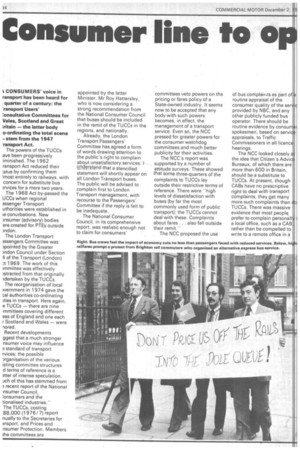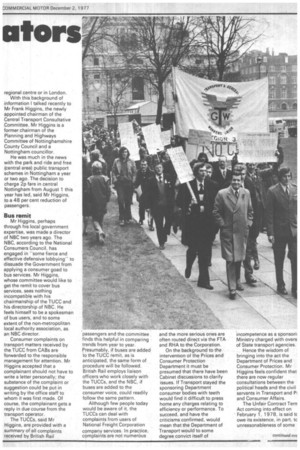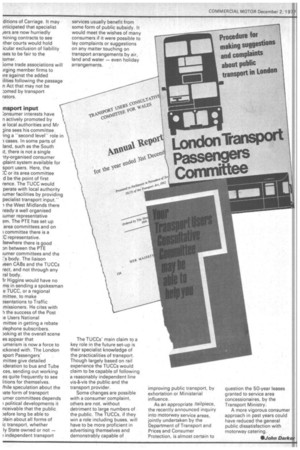Consumer , line to o
Page 98

Page 99

Page 100

If you've noticed an error in this article please click here to report it so we can fix it.
ohm
1 CONSUMERS voice in ransport has been heard for quarter of a century: the 'ransport Users' :onsultative Committees for Vales, Scotland and Great ■ ritain — the latter body o-ordinating the total scene stem from the 1947 ransport Act.
The powers of the TUCCs ave been progressively iminished. The 1962 ransport Act reduced their :atus by confirming them most entirely to railways, with concern for substitute bus 3rvices for a mere two years. The 1968 Act by-passed the UCCs when regional assenger Transport uthorities were established in ie conurbations. New )nsumer (advisory) bodies ere created for PTEs outside )ndon.
The London Transport 3ssengers Committee was )pointed by the Greater )ndon Council under Section 1of the Transport (London) 3t 1969. The work of this )mmittee was effectively )stracted from that originally idertaken by the TUCCs. The reorganisation of local wernment in 1 974 gave the :la' authorities co-ordinating flies in transport. Here again, e TUCCs — there are nine r-ilmittees covering different eas of England and one each r Scotland and Wales — were lored.
Recent developments ggest that a much stronger nsumer voice may influence 3 standard of transport rvices; the possible 3rganisation of the various isting committee structures d terms of reference is a utter of intense speculation. ich of this has stemmed from 3 recent report of the National nsumer Council,.
:onsumers and the tionalised industries.'' The TUCCs, costing 88,000 (1976/7) report nually to the Secretaries for msport, and Prices and nsumer Protection. Members the committees are appointed by the latter Minister, Mr Roy Hattersley, who is now considering a strong recommendation from the National Consumer Council that buses should be included in the remit of the TUCCs in the regions, and nationally.
Already, the London Transport Passengers' Committee has agreed a form of words drawing attention to the public's right to complain about unsatisfactory services. I understand that a stencilled statement will shortly appear on all London Transport buses. The public will be advised to complain first to London Transport management, with recourse to the Passengers' Committee if the reply is felt to be inadequate.
The National Consumer Council, in its comprehensive report, was realistic enough not to claim for consumers' committees veto powers on the pricing or fares policy of a State-owned industry. It seems now to be accepted that any body with such powers becomes, in effect, the management of a transport service. Even so, the NCC pressed for greater powers for the consumer watchdog committees and much better publicity for their activities.
The NCC's report was supported by a number of attitude surveys. These showed that some three-quarters of the complaints to TUCCs lay outside their restrictive terms of reference. There were "high levels of dissatisfaction with buses (by far the most commonly used form of public transport): the TUCCs cannot deal with these. Complaints about fares . .. also fall outside their remit."
The NCC proposed the use of bus complaints as part of routine appraisal of the consumer quality of the serv provided by NBC, and any other publicly funded bus operator. There should be routine evidence by consum t spokesmen, based on servicio appraisals, to Traffic Commissioners in all licence hearings.
The NCC looked closely at the idea that Citizen's Advict:1 Bureaux, of which there are more than 600 in Britain, should be a substitute to TUCCs. At present, though CABs have no prescriptive right to deal with transport complaints, they get many more such complaints than clo TUCCs. There was massive evidence that most people prefer to complain persona41 a local office, such as a CAB, rather than be compelled to write to a remote office in a regional centre or in London.
With this background of information I talked recently to Mr Frank Higgins, the newly appointed chairman of the Central Transport Consultative Committee. Mr Higgins is a former chairman of the Planning and Highways Committee of Nottinghamshire County Council and a Nottingham councillor.
He was much in the news with the park and ride and free (central area) public transport schemes in Nottingham a year or two ago. The decision to charge 2p fare in central Nottingham from August 1 this year has led, said Mr Higgins, to a 48 per cent reduction of passengers.
Bus remit Mr Higgins, perhaps through his local government expertise, was made a director of NBC two years ago. The NBC, according to the National Consumers Council, has engaged in —some fierce and effective defensive lobbying" to dissuade the Government from applying a consumer goad to bus services. Mr Higgins, whose committee would like to get the remit to cover bus services, sees nothing incompatible with his chairmanship of the TUCC and his directorship of NBC. He feels himself to be a spokesman of bus users, and to some extent of the non-metropolitan local authority association, as an NBC director.
Consumer complaints on transport matters received by the TUCC from CABs are forwarded to the responsible management for attention. Mr Higgins accepted that a complainant should not have to write a letter personally; the substance of the complaint or suggestion could be put in writing by the office staff to whom it was first made. Of course, the complainant gets a reply in due course from the transport operator.
The TUCCs, said Mr Higgins, are provided with a summary of all complaints received by British Rail passengers and the committee. finds this helpful in comparing • trends from year to year. Presumably, if buses are added to the TUCC remit, as is anticipated, the same form of procedure will be followed. British Rail employs liaison officers who work closely with the TUCCs, and the NBC, if buses are added to the consumer voice, could readily follow the same pattern.
Although few people today would be aware of it, the TUCCs can deal with complaints from users of National Freight Corporation company services. In practice, complaints are not numerous and the more serious ones are often routed direct via the FTA and RHA to the Corporation.
On the background to the intervention of the Prices and Consumer Protection Department it must be presumed that there have been Cabinet discussions to clarify issues. If Transport stayed the sponsoring Department consumer bodies with teeth would find it difficult to press home any charges relating to efficiency or performance. To succeed, and have the criticisms confirmed, would mean that the Department of Transport would to some degree convict itself of incompetence as a sponsorii Ministry charged with avers of State transport agencies.
Hence the wisdom of bringing into the act the Department of Prices and Consumer Protection, Mr Higgins feels confident that there are now regular consultations between the political heads and the civil servants in Transport and Pi and Consumer Affairs.
The Unfair Contract Tern Act corning into effect on February 1, 1978, is said tc owe its existence, in part, tc unreasonableness of some ditions of Carriage. It may inticipated that specialist (ers are now hurriedly nining contracts to see .ther courts would hold icular exclusion of liability ises to be fair to the tomer.
;ome trade associations will .irging member firms to ire against the added ilities following the passage n Act that may not be 3omed by transport rators.
insport input ;onsumer interests have n actively promoted by le local authorities and Mr ins sees his committee 'ing a "second level role in .1 cases. In some parts of land, such as the South ;t, there is not a single My-organised consumer [plaint system available for sport users. Here, the ;C or its area committee
d be the point of first
rence. The TUCC would perate with local authority iumer facilities by providing pecialist transport input." the West Midlands there ready a well organised wmer representative am. The PTE has set up area committees and on 1 committee there is a
representative.
lsewhere there is good Dn between the PTE ;umer committees and the :'s body. The liaison ieen CABs and the TUCCs rect, and not through any ral body.
Ir Higgins would have no ms in sending a spokesman e TUCC, or a regional mittee, to make ?.sentations to Traffic missioners. He cites with 1 the success of the Post :e Users National mittee in getting a rebate .lephone subscribers. )oking at the overall scene es appear that umerism is now a force to :ckoned with. The London sport Passengers' mittee give detailed ideration to bus and Tube ces, sending out working es quite frequently to see litions for themselves. (hile speculation about the late form of transport umer committees depends 1 political developments it nceivable that the public )efore long be able to plain about all forms of ic transport, whether ly State owned or not independent transport services usually benefit from some form of public subsidy. It would meet the wishes of many consumers if it were possible to lay complaints or suggestions on any matter touching on transport arrangements by air, land and water — even holiday arrangements.
The TUCCs' main claim to a key role in the future set-up is their specialist knowledge of the practicalities of transport Though largely based on rail experience the TUCCs would claim to be capable of following a reasonably independent line vis-à-vis the public and the transport provider.
Some changes are possible with a consumer complaint, others are not, without detriment to large numbers of the public. The TUCCs, if they win a role including buses, will have to be more proficient in advertising themselves and demonstrably capable of improving public transport, by exhortation or Ministerial influence.
As an appropriate ;tailpiece, the recently announced inquiry into motorway service areas, jointly undertaken by the Department of Transport and Prices and Consumer Protection, is almost certain to
question the 50-year leases granted to service area concessionaires, by the Transport Ministry.
A more vigorous consumer approach in past years could have reduced the general public dissatisfaction with motorway catering.
111John Dark














































































































































